16 start with M start with M
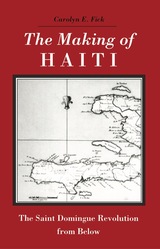
In 1789 the French colony of Saint Domingue was the wealthiest and most flourishing of the Caribbean slave colonies, its economy based on the forced labor of more than half a million black slaves raided from their African homelands. The revolt of this underclass in 1791—the only successful slave rebellion in history—gained the slaves their freedom and set in motion the colony's struggle for independence as the black republic of Haiti.
In this pioneering study, Carolyn E. Fick argues that the repressed and uneducated slaves were the principal architects both of their own freedom and of the successful movement toward national independence. Fick identifies "marronage," the act of being a fugitive slave, as a basic unit of slave resistance from which the revolution grew and shows how autonomous forms of popular slave participation were as important to the success of the rebellion as the leadership of men like Toussaint Louverture, Henri Christophe, and Dessalines. Using contemporary manuscripts and previously untapped archival sources, the author depicts the slaves, their aspirations, and their popular leaders and explains how they organized their rebellion.
Fick places the Saint Domingue rebellion in relation to the larger revolutionary movements of the era, provides background on class and caste prior to the revolution, the workings of the plantation system, the rigors of slave life, and the profound influence of voodoo. By examining the rebellion and the conditions that led to it from the perspective of the slaves it liberated, she revises the history of Haiti.
Carolyn Fick is currently a Canada Research Fellow at Concordia University in Montreal.
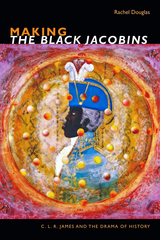

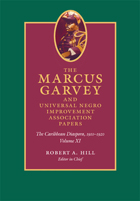
Praise for the Previous Volumes:
“The Marcus Garvey and Universal Negro Improvement Association Papers will take its place among the most important records of the Afro-American experience. . . . ‘The Marcus Garvey Papers’ lays the groundwork for a long overdue reassessment of Marcus Garvey and the legacy of racial pride, nationalism and concern with Africa he bequeathed to today’s black community.”—Eric Foner, the New York Times Book Review
“Until the publication of The Marcus Garvey and Universal Negro Improvement Association Papers, many of the documents necessary for a full assessment of Garvey’s thought or of his movement’s significance have not been easily accessible. Robert A. Hill and his staff . . . have gathered over 30,000 documents from libraries and other sources in many countries. . . . The Garvey papers will reshape our understanding of the history of black nationalism and perhaps increase our understanding of contemporary black politics.”—Clayborne Carson, the Nation
“Now is our chance, through these important volumes, to finally begin to come to terms with the significance of Garvey’s complex, fascinating career and the meaning of the movement he built.”—Lawrence W. Levine, the New Republic
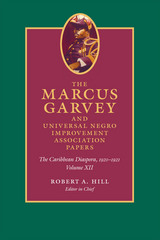
Volume XII highlights the centrality of the Caribbean people not only to the convention, but also to the movement. The reports to the convention discussed the range of social and economic conditions obtaining in the Caribbean, particularly their impact on racial conditions. The quality of the discussions and debates were impressive. Contained in these reports are some of the earliest and most clearly enunciated statements in defense of social and political freedom in the Caribbean. These documents form an underappreciated and still underutilized record of the political awakening of Caribbean people of African descent.
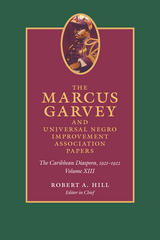
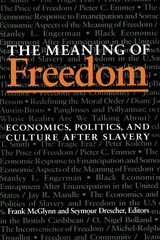

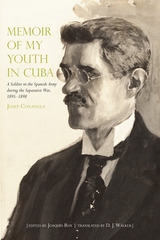
Spaniard Josep Conangla was conscripted at the age of twenty and sent to Cuba. In the course of his time there, he reaffirmed his pacifism and support of Cuban independence. The young man was a believer who unfailingly connected his view of events to the Christian humanitarianism on which he prided himself. Conangla’s advanced education and the influence of well-placed friends facilitated his assignment to safe bureaucratic positions during the war, ensuring that he would not see combat. From his privileged position, he was a keen observer of his surroundings. He described some of the decisions he made—which at times put him at odds with the military bureaucracy he served—along with what he saw as the consequences of General Valeriano Weyler’s decree mandating the reconcentración, an early version of concentration camps. What Conangla saw fueled his revulsion at the collusion of the Spanish state and its state-sponsored religion in that policy. “Red Mass,” published six years after the War of Independence and included in his memoir, is a vivid expression in verse of his abhorrence.
Conangla’s recollections of the contacts between Spaniards and Cubans in the areas to which he was assigned reveal his ability to forge friendships even with Creole opponents of the insurrection. As an aspiring poet and writer, Conangla included material on fellow writers, Cuban and Spanish, who managed to meet and exchange ideas despite their circumstances. His accounts of the Spanish defeat, the scene in Havana around the end of the war, along with his return to Spain, are stirring.
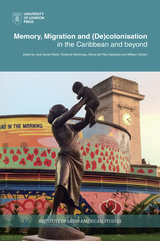
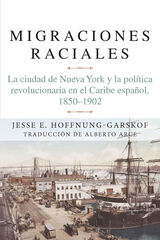
A fines del siglo XIX, un grupo pequeño de cubanos y puertorriqueños de ascendencia africana se instaló en las viviendas segregadas de la ciudad de Nueva York. En una sociedad de instrucción y recreo que fundaron en Greenwich Village, estos primeros neoyorquinos afrolatinos aprendieron a ser poetas, periodistas y revolucionarios. Al mismo tiempo, estos individuos—liderados por Rafael Serra, tabaquero, escritor y político; Sotero Figueroa, tipógrafo y editor; y Gertrudis Heredia, una de las primeras mujeres afrodescendientes que estudió en la Clínica de Partos de la Universidad de La Habana--construyeron una red política y articularon un ideal de nacionalismo revolucionario centrado en los proyectos de justicia racial y social. Sus esfuerzos tuvieron una profunda influencia en los escritos del poeta y diplomático José Martí sobre raza y en su apuesta por el liderazgo entre los exiliados cubanos. Desde Nueva York, este grupo también luchó en años posteriores por crear espacios para la participación política negra en la República de Cuba.
En Migraciones raciales, Jesse Hoffnung-Garskof presenta un vívido retrato de estos migrantes revolucionarios quienes habían sido, en gran parte, olvidados, entretejiendo sus experiencias de “migrar siendo negros,” sus relaciones con líderes afro-americanos en la lucha por la igualdad racial en Estados Unidos, y su participación en el desarrollo de los movimientos políticos nacionalistas antillanos. Destacando el papel fundamental de los neoyorquinos afrolatinos en la historia de la política revolucionaria del caribe hispánico, Hoffnung-Garskof ofrece una nueva interpretación del movimiento separatista y de su idea de que Cuba podría convertirse en una nación sin divisiones raciales.
Un modelo de investigación transnacional y comparativa, Migraciones raciales revela las complejidades de las formaciones raciales dentro de las comunidades migrantes y el poder de pequeños grupos de inmigrantes para transformar sus sociedades de origen.

Minds, Brains and Science takes up just the problems that perplex people, and it does what good philosophy always does: it dispels the illusion caused by the specious collision of truths. How do we reconcile common sense and science? John Searle argues vigorously that the truths of common sense and the truths of science are both right and that the only question is how to fit them together.
Searle explains how we can reconcile an intuitive view of ourselves as conscious, free, rational agents with a universe that science tells us consists of mindless physical particles. He briskly and lucidly sets out his arguments against the familiar positions in the philosophy of mind, and details the consequences of his ideas for the mind-body problem, artificial intelligence, cognitive science, questions of action and free will, and the philosophy of the social sciences.
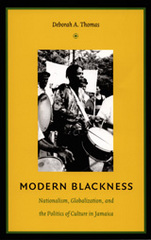
Thomas combines historical research with fieldwork she conducted in Jamaica between 1993 and 2003. Drawing on her research in a rural hillside community just outside Kingston, she looks at how Jamaicans interpreted and reproduced or transformed on the local level nationalist policies and popular ideologies about progress. With detailed descriptions of daily life in Jamaica set against a backdrop of postcolonial nation-building and neoliberal globalization, Modern Blackness is an important examination of the competing identities that mobilize Jamaicans locally and represent them internationally.
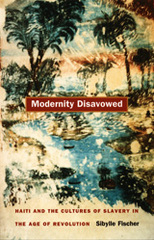
Fischer draws on history, literary scholarship, political theory, philosophy, and psychoanalytic theory to examine a range of material, including Haitian political and legal documents and nineteenth-century Cuban and Dominican literature and art. She demonstrates that at a time when racial taxonomies were beginning to mutate into scientific racism and racist biology, the Haitian revolutionaries recognized the question of race as political. Yet, as the cultural records of neighboring Cuba and the Dominican Republic show, the story of the Haitian Revolution has been told as one outside politics and beyond human language, as a tale of barbarism and unspeakable violence. From the time of the revolution onward, the story has been confined to the margins of history: to rumors, oral histories, and confidential letters. Fischer maintains that without accounting for revolutionary antislavery and its subsequent disavowal, Western modernity—including its hierarchy of values, depoliticization of social goals having to do with racial differences, and privileging of claims of national sovereignty—cannot be fully understood.
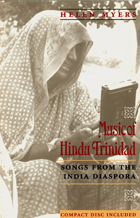
Myers details the musical repertory of Felicity, which is based largely on north Indian genres including the traditional Bhojpuri folk songs and drumming styles brought by the first indentured laborers in 1845. In her engaging exploration of the fate of Indian classical music and new popular styles such as Hindi calypso, soca, and chutney, she even finds herself at the ancestral home of Trinidadian V. S. Naipaul in India. Copiously illustrated and accompanied by a compact disk, Music of Hindu Trinidad is a model ethnographic study.
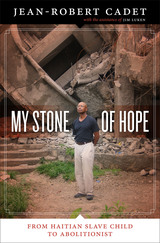
There are 27 million slaves living in the world today—more than at any time in history. Three hundred thousand of them are impoverished children in Haiti, who "stay with" families as unpaid and uneducated domestic workers, subject to physical, emotional, and sexual abuse. This practice, known locally as restavek ("staying with"), is so widespread that one in ten Haitian children is caught up in this form of slavery.
Jean-Robert Cadet was a restavek in Haiti from the late 1950s until the early 1970s. He told the harrowing story of his youth in Restavec: From Haitian Slave Child to Middle-Class American—a landmark book that exposed ongoing child slavery in Haiti. Now in My Stone of Hope, Cadet continues his story from his early attempts to adjust to freedom in American society to his current life mission of eliminating child slavery through advocacy and education. As he recounts his own struggles to surmount the psychological wounds of slavery, Cadet puts a human face on the suffering that hundreds of thousands of Haitians still endure daily. He also builds a convincing case that child slavery is not just one among many problems that Haiti faces as the Western Hemisphere's poorest nation. Rather, he argues that the systematic abuse of so many of its children is Haiti's fundamental problem, because it creates damaged adults who seem incapable of governing the country justly or managing its economy productively.
For everyone concerned about the fate of Haiti, the welfare of children, and the freedom of people around the globe, My Stone of Hope sounds an irresistible call to action.
READERS
Browse our collection.
PUBLISHERS
See BiblioVault's publisher services.
STUDENT SERVICES
Files for college accessibility offices.
UChicago Accessibility Resources
home | accessibility | search | about | contact us
BiblioVault ® 2001 - 2024
The University of Chicago Press









